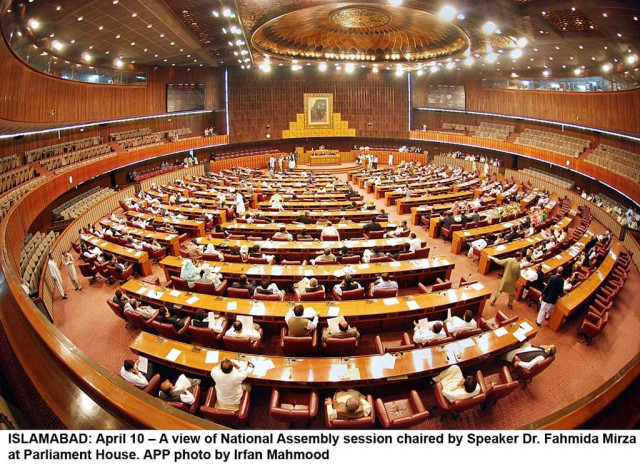Amendment bills on cannibalism, protection of journalists introduced in NA
11 bills were introduced - a record in legislative business of current parliamentary year

It was a private members day, and a bulk of legislative business was taken up, with private legislative bills being introduced by members.
Bills were later referred to the standing committees concerned for further discussion by the NA speaker.
Prominent among these amendment bills include proposal for changes in the Pakistan Penal Code (Act XLV of 1860), and the Code of Criminal Procedure, 1998 (Act V of 1898) (The Criminal law (Amendment) Bill, 2014.
The bill was introduced by Muttahida Qaumi Movement (MQM) lawmakers SA Iqbal Qadri, Abdul Rashid Godel, Sufyan Yusuf, Sajid Ahmed and Iqbal Mohamamd Ali.
The amendment bill aims to curb cannibalism, and introduce punishment for those who unearth corpses or any body part, without permission from a competent authority.
The proposed law suggests imprisonment up to seven years, along with imposition of a fine.
Section 297-B states that whoever exhumes corpse or any part of corpse with intent to cook, eat, sell or to use for magic purposes, among others, shall be imprisoned, either for a specified term, which shall not be less than ten years or for life. The convict shall also be liable to pay a fine.
Two other similar amendment bills were also introduced and the NA speaker suggested clipping them into a single bill.
One of the bills was introduced by Dr Nikhat Shakeel Khan, Sheikh Salahuddin, Muhammad Muzamil Qureshi and Khisher Zehra.
All these bills were presented in the backdrop of worrisome incidents of cannibalism in Punjab. Culprits were arrested in 2011 for digging up human corpses and later eating them; however were later released due to absence of any laws to punish them.
Protection of journalists
Another bill was introduced by Jamaat-e-Islami (JI) lawmakers for an amendment in the Pakistan Penal Code, 1860 and the Code of Criminal Procedure 1989(The Criminal Law (Amendment) Bill, 2014 for journalists’ protection.
It was aimed to insert a clause for the protection of working journalists currently on the hit list of militant groups.
The JI noted that journalists were being harassed, targeted and killed, but there were no effective laws to protect them.
“More than 80 journalists have been killed since January 2000 to date, while attacks, violence, murder, kidnapping, harassment, and detentions of journalists were committed at least 2,000 times.”
The bill proposes legislation for security of journalists and their families through establishment of the National Press Council such that problems for them could be reduced.
Rights for dual citizens
MQM lawmakers also introduced an amendment for voting rights, and the right to contest elections to overseas Pakistanis.
In the amendment, Muttahida suggested that dual citizens’ rights of vote and right to run the elections should not be affected.
Minister for Science and Technology suggested consultation before bringing an amendment. He did not oppose the bill, however.
Ebola virus
Under a calling attention notice, Pakistan Muslim League-Nawaz MNA Shaista Pervez Malik brought attention of the house towards the threat of Ebola virus, and sought effective measures to stop it from breaking out in the country.
Parliamentary secretary for health service Javed Akhlas said the government was taking all measures to control the virus from entering into Pakistan from the affected countries.
He said the government, in collaboration with the provincial departments concerned, USAID and UNICEF was taking steps to meet the challenge.
Other bills initiated include proposals for amendments in the Civil Service Act 1973, Islamabad Restriction Ordinance, 2001, election laws, replacing English with Urdu as official language, and increasing NA seats in Balochistan, among others.
Dual voting rights for minorities
PML-N MNA Dr Ramesh Kumar Vankwani introduced a bill for dual voting rights for non-Muslims.
Vankwani, who is also heads the national Hindu Council, said non-Muslims must have dual votes, one for a general seat and another for minority seats (reserved seats for minorities).



















COMMENTS
Comments are moderated and generally will be posted if they are on-topic and not abusive.
For more information, please see our Comments FAQ